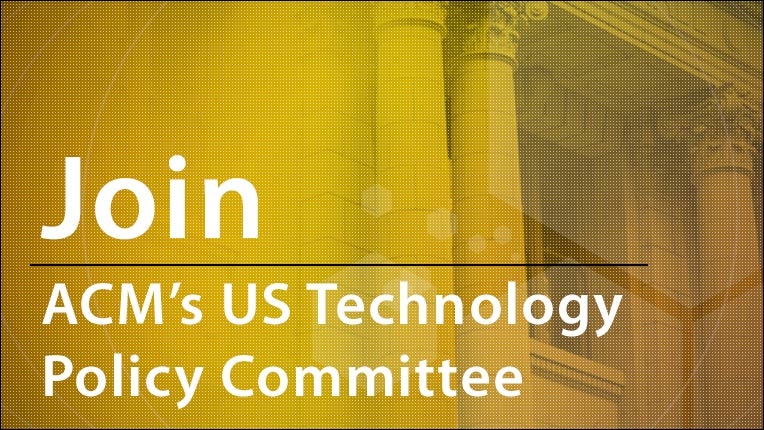Key Issues and Resources
ACM’s US Technology Policy Committee regularly produces data-driven, apolitical statements, reports and other materials on a wide range of computing-related policy issues. Current key issues and resources include:
Accessibility
![]()
- Statement in Support of Mandatory Comprehensive Digital Accessibility Regulations, US Technology Policy Committee (May 31, 2024)
- Comments to DHS Cybersecurity and Infrastructure Security Agency re: Secure Software Design, US Technology Policy Committee (February 20, 2024)
- Comments to Department. of Justice on Accessibility Standards for Government Websites, US Technology Policy Committee (October 2, 2023)
- Statement on Principles for the Development and Deployment of Equitable, Private, and Secure Remote Proctoring Systems, US Technology Policy Committee (December 16, 2022)
- Letter to US Dept. of Justice re: Codifying Regulations for ADA-Compliant Websites, ACM US Technology Policy Committee (May 18, 2022)
- Comments to National Institute of Standards and Technology on Draft Promoting Access to Voting Report (November 22, 2021)
- Statement on Accessibility, Usability, and Digital Inclusiveness (2017)
- Comments to the U.S. Department of Justice on Accessibility (2016)
- Statement on 25th Anniversary of the Americans with Disabilities Act (2015)
- Comments to the U.S. Access Board on Accessibility (2015)
- Comments to the National Institute of Standards and Technology on Accessible and Usable Voting Systems (2015)
AI & Algorithms
![]()
-
Comments to DHS Cybersecurity and Infrastructure Security Agency re: Secure Software Design, US Technology Policy Committee (February 20, 2024)
-
Response to OMB Request for Comments Regarding Advancing Governance, Innovation, and Risk Management for Agency Use of Artificial Intelligence, US Technology Policy Committee (December 5, 2023)
-
Response to US Copyright Office Concerning Study of Artificial Intelligence and Copyright, US Technology Policy Committee (November 29, 2023)
- Comments to Departments of State and Commerce on G7 Hiroshima AI Process Principles, US Technology Policy Committee (October 24, 2023)
- Comments to Federal Election Commission on Petition for Clarification of Fraudulent Misrepresentation Statute, US Technology Policy Committee (October 15, 2023)
- Statement on Development and Use of Generative AI Content Detection Systems, US Technology Policy Committee (October 6, 2023)
- Letter to FDA re AI in Development of Drug and Biological Products, US Technology Policy Committee (August 7, 2023)
- Comments to White House OSTP on National AI Priorities, US Technology Policy Committee (July 7, 2023)
- Joint Principles for the Development, Deployment, and Use of Generative AI Technologies, ACM TPC, Europe/US Technology Policy Committees (June 27, 2023)
- Comments to White House OSTP on Automated Worker Surveillance and Management, US Technology Policy Committee (June 15, 2023)
- Comments on AI Accountability to the National Telecommunication and Information Administration, US Technology Policy Committee (June 12, 2023)
- Comments to Food and Drug Administration re AI in Drug Manufacturing, US Technology Policy Committee (May 1, 2023)
- Statement on Principles for the Development and Deployment of Equitable, Private, and Secure Remote Proctoring Systems, US Technology Policy Committee (December 16, 2022)
- Joint Statement on Principles for Responsible Algorithmic Systems, ACM TPC, Europe/US Technology Policy Committees (October 26, 2022)
- Comments to NIST on Update of the National Artificial Intelligence R&D Strategic Plan, US Technology Policy Committee (March 4, 2022)
- Statement of Interest and Comments to US Copyright Office re: Technical Measures (February 8, 2022)
- Comments to NSF/OSTP on National AI Research Resource Implementation (October 1, 2021)
- Comments on National Institute of Standards and Technology RFI re Artificial Intelligence Risk Management Framework (August 19, 2021)
- Joint Comments with Computing Research Association on Enhancing Federal Scientific Integrity Policies to White House Office of Science and Technology Policy (July 28, 2021)
- Joint Comments to Dept. of Commerce Bureau of Industry Security on Foundational Technology Export Controls (October 29, 2020)
- Statement on Facial Recognition Technologies (June 30, 2020)
- Comments to Food and Drug Administration on AI-Augmented Software as a Medical Device Discussion Paper (June 3, 2019)
- Comments on Computing Community Consortium’s Draft of 20-Year Roadmap for Artificial Intelligence Research in the US (May 30, 2019)
- Joint Comments to Dept. of Commerce Bureau of Industry Security on Emerging Technology Export Controls (January 10, 2019)
- Comments to NSF re: Revision of the 2016 National Artificial Intelligence R&D Strategic Plan (October 26, 2018)
- Joint Letter to NSF Endorsing Comments of the Computing Community Consortium on Revision of the 2016 National Artificial Intelligence R&D Strategic Plan (October 26, 2018)
- Joint Petition to White House Office of Science & Technology Policy Requesting Mechanism for Public Input on Development of National Artificial Intelligence Policy (July 4, 2018)
- Statement on Algorithmic Transparency and Accountability, ACM U.S. Public Policy Council, ACM Europe Council Policy Committee (2017)
Cybersecurity
![]()
- Comments to National Science Foundation and NITRD re 2023 Cybersecurity R&D Strategic Plan, US Technology Policy Committee (March 14, 2023)
- Statement on Principles for Secure Remote Test Administration, ACM US Technology Policy Committee (August 12, 2021)
- Joint “Long Comment” to US Copyright Office Supporting Expansion of DMCA Security Research Exemption, ACM US Technology Policy Committee (March 10, 2021)
- Joint Detailed Request to US Copyright Office for Expansion of DMCA Security Research Exemption, ACM US Technology Policy Committee (December 14, 2020)
- Joint Request to US Copyright Office for Expansion of DMCA Security Research Exemption, US Technology Policy Committee (September 8, 2020)
- Joint Request for Renewal of Digital Millennium Copyright Act Security Research Exemption, US Technology Policy Committee (July 22, 2020)
- Statement on Mandatory Engineered Law Enforcement Access to Information Infrastructure and Devices (April 12, 2018)
- Comments to NTIA re: Promoting Stakeholder Action Against Botnets and Other Automated Threats (February 12, 2018)
- Comments to the U.S. Copyright Office on Computing Security Research Exemptions under the Digital Millennium Copyright Act (2018)
- Statement on Computing and Network Security (2017)
- Comments to the Presidential Commission on Enhancing National Cybersecurity (2016)
- Comments to the U.S. Copyright Office on Digital Millennium Copyright Act, Section 1201 Policy Study (2016)
- Comments to the National Institute of Standards and Technology on U.S. Participation in International Cybersecurity Standardization (2015)
Digital Privacy

- Comments to Office of Management and Budget on Privacy Impact Assessments, US Technology Policy Committee (April 1, 2024)
- Comments to National Telecommunications and Information Administration on Privacy, Justice, and Civil Rights, US Technology Policy Committee (March 6, 2023)
- Comments to National Institute of Standards & Technology on De-Identification of Government Data Sets Report, US Technology Policy Committee (January 17, 2023)
- Statement on Principles for the Development and Deployment of Equitable, Private, and Secure Remote Proctoring Systems, US Technology Policy Committee (December 16, 2022)
- US Supreme Court Amicus Curiae Brief in Van Buren v US (July 8, 2020)
- Statement on Security and Privacy Principles for Virtual Meetings (May 26, 2020)
- Letter to Senate Task Force on Privacy Chair Blackburn Calling for Maximum Public Input and Transparency in Panel's Work (July 22, 2019)
- Comments to National Institute of Standards and Technology on Developing a Privacy Framework (January 14, 2019)
- Comments to NTIA re: Developing the Administration’s Approach to Consumer Privacy (November 8, 2018)
- Joint Letter to Senate Judiciary Committee Leaders Urging Rapid Action to Fill Vacancies on Privacy & Civil Liberties Oversight Board (August 29, 2018)
- Letter to U.S. Senate re: “Recommendations and Call for Action to Address Data Privacy Risks and harms Revealed by Facebook/Cambridge Analytica Inquiries” (July 2, 2018)
- Letter to US Senate Calling for Consumer Privacy Protections to Safeguard Data (July 2, 2018)
- Letter to U.S. Senators on Committee Consideration of Facebook Data Compromises (April 9, 2018)
- Statement on the Importance of Preserving Personal Privacy, including ten Foundational Privacy Principles and Practices (March 2018)
Election Security
![]()
- Comments to the US Election Assistance Commission re Voluntary Voting System Guidelines 2.0 (June 7, 2023)
- Comments to National Institute of Standards and Technology on Draft Promoting Access to Voting Report (November 22, 2021)
- Comments to the National Institute of Standards and Technology on Promoting Access to Voting (July 16, 2021)
- Joint Letter to Utah State Rep. S. Harrison re: Insecurity of Online Voting (December 22, 2020)
- Joint Letter to Utah State Representatives re: Insecurity of Online Voting (December 22, 2020)
- Comments on Voluntary Voting System Guidelines 2.0 (June 22, 2020)
- Comments on US Election Assistance Commission's Voluntary Voting System Guidelines, Version 2.0 (May 29, 2019)
- Joint Letter to Governors and Secretaries of State on the Insecurity of Online Voting (April 9, 2020)
- Comments on US Election Assistance Commission’s Voluntary Voting System Guidelines, Version 2.0 (May 29, 2019)
- Joint Report on Email and Internet Voting: The Overlooked Threat to Election Security (October 10, 2018)
- Letters to the U.S. Election Assistance Commission (EAC) suggesting future activities (2015)
Ethics & Computing
![]()
ACM’s Code of Ethics and Professional Conduct for computing professionals is the computing profession’s international “gold standard.” After a three-year process of consultation with its 100,000 members around the globe, in July of 2018 ACM released a comprehensively revised version of the Code for the modern era. It begins:
Computing professionals’ actions change the world. To act responsibly, they should reflect upon the wider impacts of their work, consistently supporting the public good. The ACM Code of Ethics and Professional Conduct expresses the conscience of the profession.
Intellectual Property
![]()
- Statement of Interest and Comments to US Copyright Office re: Technical Measures (February 8, 2022)
- Joint “Long Comment” to US Copyright Office Supporting Expansion of DMCA Security Research Exemption, ACM US Technology Policy Committee (March 10, 2021)
- Joint Detailed Request to US Copyright Office for Expansion of DMCA Security Research Exemption, ACM US Technology Policy Committee (December 14, 2020)
- Joint Request to US Copyright Office for Expansion of DMCA Security Research Exemption, US Technology Policy Committee (September 8, 2020)
- Joint Request for Renewal of Digital Millennium Copyright Act Security Research Exemption, US Technology Policy Committee (July 22, 2020)
- Comments to the U.S. Copyright Office on Computing Security Research Exemptions under the Digital Millennium Copyright Act (2017)
- Comments to the U.S. Copyright Office on Digital Millennium Copyright Act, Section 1201 Policy Study (2016)
- Comments to the U.S. Copyright Office on Computing Security Research Exemptions under the Digital Millennium Copyright Act (2015)
Internet of Things
![]()
- Statement on Internet of Things Privacy and Security (2017)
- Comments to the U.S. Department of Commerce on Internet of Things Green Paper (2017)
- Comments to the U.S. Department of Commerce on the Internet of Things (2016)
